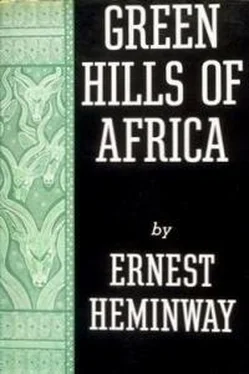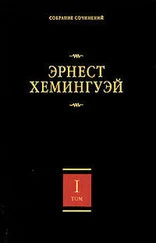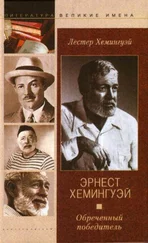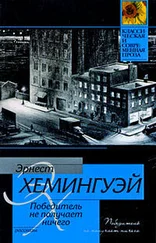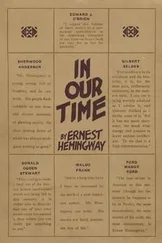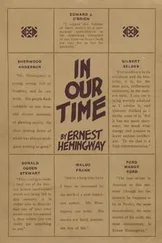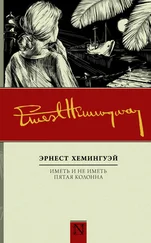'The hell of it is,' I said to Pop, 'when I'm in the hills I'm sure the bastards are down there on the salt. The cows are in the hills but I don't believe the bulls are with them now. Then you get there in the evening and there are the tracks. They have been on the lousy salt. I think they come any time.'
'Probably they do.'
'I'm sure we get different bulls there. They probably only come to the salt every couple of days. Some are certainly spooked because Karl shot that one. If he'd only killed it clean instead of following it through the whole damn countryside. Christ, if he'd only kill any damn thing clean. Other new ones will come in. All we have to do is to wait them out, though. Of course they can't all know about it. But he's spooked this country to hell.'
'He gets so very excited,' Pop said. 'But he's a good lad. He made a beautiful shot on that leopard, you know. You don't want them killed any cleaner than that. Let it quiet down again.'
'Sure. I don't mean anything when I curse him.'
'What about staying in the blind all day?'
'The damned wind started to go round in a circle. It blew our scent every direction. No use to sit there broadcasting it. If the damn wind would hold. Abdullah took an ash can to–day.'
'I saw him starting off with it.'
There wasn't a bit of wind when we stalked the salt and there was just light to shoot. He tried the wind with the ashes all the way. I went alone with Abdullah and left the others behind and we went quietly. I had on these crêpe–soled boots and it's soft cotton dirt. The bastard spooked at fifty yards.
'Did you ever see their ears?'
'Did I ever see their ears? If I can see his ears, the skinner can work on him.'
'They're bastards,' Pop said. 'I hate this salt–lick business. They're not as smart as we think. The trouble is you're working on them where they are smart. They've been shot at there ever since there's been salt.'
'That's what makes it fun,' I said. 'I'd be glad to do it for a month. I like to hunt sitting on my tail. No sweat. No nothing. Sit there and catch flies and feed them to the ant lions in the dust. I like it. But what about the time?'
'That's it. The time.'
'So,' Kandisky was saying to my wife. 'That is what you should see. The big ngomas . The big native dance festivals. The real ones.'
'Listen,' I said to Pop. 'The other lick, the one I was at last night, is fool–proof except for being near that bloody road.'
'The trackers say it is really the property of the lesser kudu. It's a long way too. It's eighty miles there and back.'
'I know. But there were four big bull tracks. It's certain. If it wasn't for that lorry last night. What about staying there to–night! Then I'd get the night and the early morning and give this lick a rest. There's a big rhino there too. Big track, anyway.'
'Good,' Pop said. 'Shoot the rhino too.' He hated to have anything killed except what we were after, no killing on the side, no ornamental killing, no killing to kill, only when you wanted it more than you wanted not to kill it, only when getting it was necessary to his being first in his trade, and I saw he was offering up the rhino to please me.
'I won't kill him unless he's good,' I promised.
'Shoot the bastard,' Pop said, making a gift of him.
'Ah, Pop,' I said.
'Shoot him,' said Pop. 'You'll enjoy it, being by yourself. You can sell the horn if you don't want it. You've still one on your licence.'
'So,' said Kandisky. 'You have arranged a plan of campaign? You have decided on how to outwit the poor animals?'
'Yes,' I said. 'How is the lorry?'
'That lorry is finished,' the Austrian said. 'In a way I am glad. It was too much of a symbol. It was all that remained of my shamba . Now everything is gone and it is much simpler.'
'What is a shamba?' asked P.O.M., my wife. 'I've been hearing about them for months. I'm afraid to ask about those words every one uses.'
'A plantation,' he said. 'It is all gone except that lorry. With the lorry I carry labourers to the shamba of an Indian. It is a very rich Indian who raises sisal. I am a manager for this Indian. An Indian can make a profit from a sisal shamba.'
'From anything,' Pop said.
'Yes. Where we fail, where we would starve, he makes money. This Indian is very intelligent, however. He values me. I represent European organization. I come now from organizing recruitment of the natives. This takes time. It is impressive. I have been away from my family for three months. The organization is organized. You do it in a week as easily, but it is not so impressive.'
'And your wife?' asked mine.
'She waits at my house, the house of the manager, with my daughter.'
'Does she love you very much?' my wife asked.
'She must, or she would be gone long ago.'
'How old is the daughter?'
'She is thirteen now.'
'It must be very nice to have a daughter.'
'You cannot know how nice it is. It is like a second wife. My wife knows now all I think, all I say, all I believe, all I can do, all that I cannot do and cannot be. I know also about my wife—completely. But now there is always someone you do not know, who does not know you, who loves you in ignorance and is strange to you both. Some one very attractive that is yours and not yours and that makes the conversation more—how shall I say? Yes, it is like—what do you call—having here with you—with the two of you—yes there—it is the Heinz Tomato Ketchup on the daily food.'
'That's very good,' I said.
'We have books,' he said. 'I cannot buy new books now but we can always talk. Ideas and conversation are very interesting. We discuss all things. Everything. We have a very interesting mental life. Formerly, with the shamba, we had the Querschnitt . That gave you a feeling of belonging, of being made a part of, to a very brilliant group of people. The people one would see if one saw whom one wished to see. You know all of those people? You must know them.'
'Some of them.' I said. 'Some in Paris. Some in Berlin.'
I did not wish to destroy anything this man had, and so I did not go into those brilliant people in detail.
'They're marvellous,' I said, lying.
'I envy you to know them,' he said. 'And tell me, who is the greatest writer in America?'
'My husband,' said my wife.
'No. I do not mean for you to speak from family pride. I mean who really? Certainly not Upton Sinclair. Certainly not Sinclair Lewis. Who is your Thomas Mann? Who is your Valéry?'
'We do not have great writers,' I said. 'Something happens to our good writers at a certain age. I can explain but it is quite long and may bore you.'
'Please explain,' he said. 'This is what I enjoy. This is the best part of life. The life of the mind. This is not killing kudu.'
'You haven't heard it yet,' I said.
'Ah, but I can see it coming. You must take more beer to loosen your tongue.'
'It's loose,' I told him. 'It's always too loose. But you don't drink anything.'
'No, I never drink. It is not good for the mind. It is unnecessary. But tell me. Please tell me.'
'Well,' I said, 'we have had, in America, skilful writers. Poe is a skilful writer. It is skilful, marvellously constructed, and it is dead. We have had writers of rhetoric who had the good fortune to find a little, in a chronicle of another man and from voyaging, of how things, actual things, can be, whales for instance, and this knowledge is wrapped in the rhetoric like plums in a pudding. Occasionally it is there, alone, unwrapped in pudding, and it is good. This is Melville. But the people who praise it, praise it for the rhetoric which is not important. They put a mystery in which is not there.'
'Yes,' he said. 'I see. But it is the mind working, its ability to work, which makes the rhetoric. Rhetoric is the blue sparks from the dynamo.'
Читать дальше
Конец ознакомительного отрывка
Купить книгу
